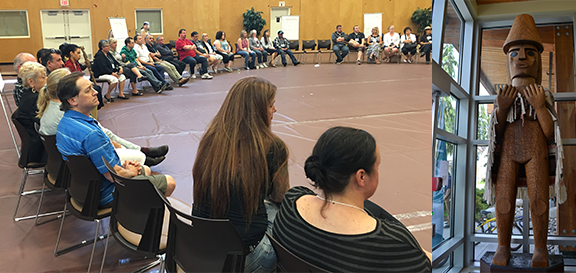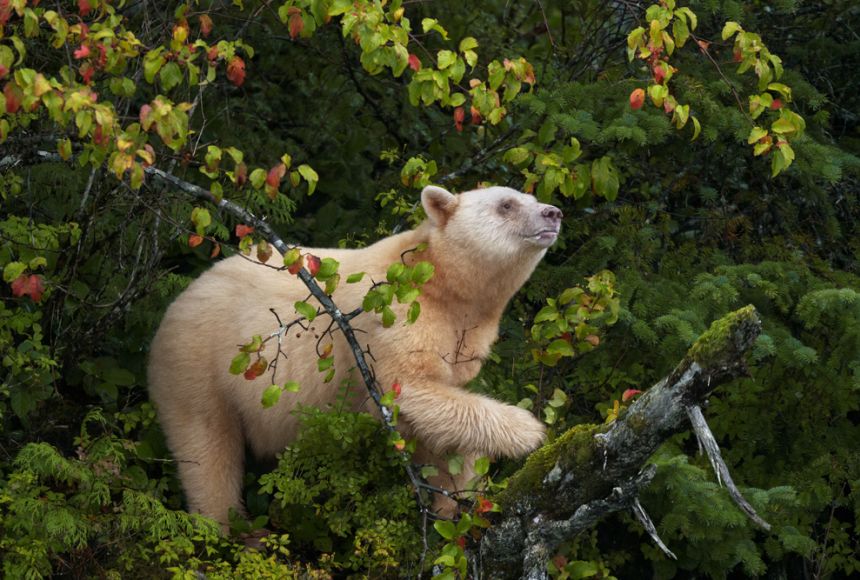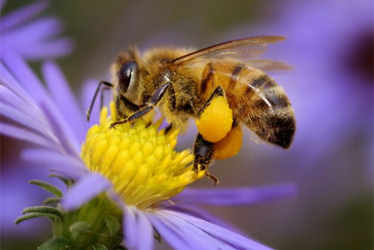On a bright and sunny June morning, Musqueam drummers and singers clad in traditional clothing led members of MoveUP’s executive council into the Musqueam Community Centre gym to take part in a reconciliation healing circle.
The impacts of colonization and residential schools have deeply harmed Canada’s indigenous people. First Nations children were torn away from their parents and forced to abandon their cultures and languages in residential schools. Many were abused mentally, physically and sexually.
To address this, the Truth and Reconciliation Commission began in 2008 and concluded in 2015. As part of their work, the TRC issued a report asking, among other things, for all Canadians engage in the reconciliation process with First Nations in order to heal and to move forward together.
MoveUP’s executive councillors decided to take part in a reconciliation circle to take on that work. It was a day of listening, learning and charting concrete, collaborative actions to build that future. They were joined in this work by Musqueam elders and facilitators from the Bright New Day Reconciliation Circles educational group.
In the large circle Nuu-chah-nulth Elder and counselor Barney Williams told his story. He was just five years old in 1944 when he was taken from his family and put in a residential school. “I didn’t know how to speak English, and I wasn’t aware that I couldn’t.” Williams was punished for speaking Nuu-chah-nulth by the same priest who would later sexually abuse him. He lived in that residential school for 13 years.
After spending the morning together in a large circle that spanned the width of the gym, councillors were broken out into smaller circles for the afternoon. Each circle included an elder and a facilitator. Everyone was encouraged to share, break down barriers, confront preconceived ideas and learn from each other.
The experience touched many of MoveUP’s councillors deeply. For several councillors, this was their first time learning about residential schools and the treatment of First Nations children.
“I learned that one of the main goals of the schools was to wipe out the indigenous culture through fear and abuse,” said ICBC Councillor Tobin Dirk. “I never really knew much about the residential schools. I wish I had known about the long-term and generational affects these schools had on indigenous people and their cultures.”
Not all of what was shared was centred on pain. In a smaller circle, Elder Mervyn Point asked the participants to “kwa hook-ah shwallowen*”, a Musqueam term that means “open your hearts and accept what you hear”. Point spoke to his circle about Musqueam traditions and history. He explained the Musqueam way of always referring to someone as “musteemah*” (proud people), meant that they were taught to speak to anyone as though that person came from a very proud and honorable lineage. He also shared some Musqueam oral history, including the names of places that we now call Vancouver, Surrey and the Lower Mainland.
When asked why unions should participate in reconciliation events, Dirk said, “The values that unions stand for, such as equality and equal opportunity should be enough reason…as a union activist I should recognize it, speak out and fight for change when our values are being violated.”
FortisBC Councillor Lea McNaughton agreed. “We need to become activists on this issue, and help other unions understand these struggles. We can join together to make a difference for future generations to be more open and educated than we are.”
“Really, the purpose of the circle was to strengthen us, collectively as a society, which I think is also the purpose of a union,” said Brody Darough-Hardekopf, also from ICBC. “Learning where others came from and what they went through helps us work together.”
“This is not an aboriginal problem,” explained MoveUP Executive Board Member Joyce Galuska. “This is a historical Canadian problem, whose history has been kept from most people for far too long. And as ugly a piece of history it is, the story needs to be revealed. Not just every union needs to take part in a reconciliation circle, every Canadian should take part. It’s the first and most important step towards true reconciliation.”
At the end of the day, each circle had to bring back solid, actionable and achievable recommendations on how to MoveUP and the councillors could work towards reconciliation. Some councillors made a commitment to advocate for more inclusion of indigenous languages in Canadian society. Others, having learned more about the crisis of unsafe drinking water in over 90 aboriginal communities, decided they would take part in a campaign demanding clean water for all.
A few councillors decided to focus on the union as a vehicle. They decided to approach the union’s education committee to talk about how to integrate reconciliation in the union’s training programs. Others promised to share what they had learned that day with their family and friends, and to ask others to take on the responsibility of reconciliation.
Galuska was born on a reserve and has been doing reconciliation work for a few years. “I learned about my family, that their dysfunction wasn’t normal, that their silence was necessary to keep their sanity, that my two aunties left Haida Gwaii because of their history, and the significant impact that residential schools had not just on my family – but my community,” she said. “I wish I knew this growing up. We never talked about it. So even as a First Nations person, I’m always learning about the impacts this legacy has had on so many people.”
“The secrets that were kept are now being revealed. And in so doing, the healing of First Nations families and communities can begin.
* spelling is phonetic
** Four councillors were named as witnesses: Jordan Mcrae and Annette Toth from ICBC, Sal Ruffolo from BC Transit and Rysa Kronebusch from BC Hydro. The Musqueam Speaker gave them responsibility of reporting faithfully on the day’s events and sharing what was learned with their communities. The witnesses have vetted this article.



